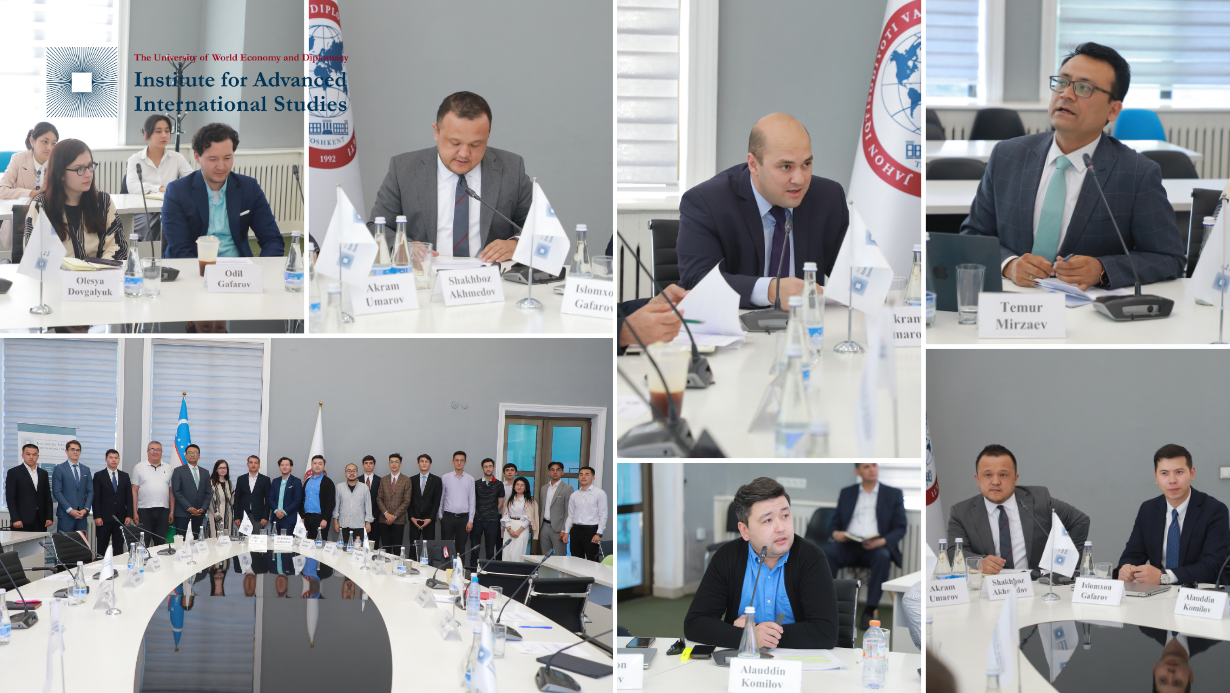
Tashkent, Uzbekistan – On May 27, the Institute for Advanced International Studies (IAIS) at the University of World Economy and Diplomacy (UWED) hosted a roundtable titled “Central Asia and China: A New Level of Partnership”. This event brought together university administration, faculty members, and international partners, including representatives from various prestigious institutions such as Southern Illinois University, Tsinghua University, the Center for Progressive Reforms, the Chinese Academy of Sciences, Tianjin University, and New Uzbekistan University.
The roundtable began with opening remarks from setting the stage for the discussions by the First Vice-Rector of UWED Dr. Akram Umarov and the Deputy Director of IAIS Mr. Shakhboz Akhmedov. The event was divided into two main panels, each focusing on different aspects of the evolving relationship between China and Central Asia.
The first panel, moderated by Mr. Shakhboz Akhmedov, delved into China’s foreign policy, exploring its new trends and changing dynamics. Experts from both domestic and international institutions provided insights into China’s global strategies and initiatives. Next, Senior Researcher at the University of Southern Illinois, Odil Gafarov, took the floor, providing a detailed overview of China's official state policy based on the five principles of foreign policy, including the policy of non-alignment and non-interference. A researcher at the Center for China and Globalization at the "Belt and Road" Institute, and a Ph.D. candidate at Tsinghua University, Zoon Ahmed Khan, presented an analysis of China's foreign policy towards Central Asia and Pakistan. In today's multipolar world, China actively promotes the "Belt and Road" initiative, seeking to legitimize it in accordance with international legal norms and commitments. Special attention is given not only to complex infrastructure projects but also to socio-economic development, emphasizing China's broader and more comprehensive approach to interacting with partner regions. Additionally, Alauddin Kamolov and Ammar Younas expressed their views on China's evolving foreign policy.
The second panel focused on the current relations between China and Central Asia. Abbos Bobokhonov, the head of the China Studies Program at the Institute of Prospective International Studies, highlighted China's active foreign policy towards Central Asia. He also shed light on the China-Kyrgyzstan-Uzbekistan railway station project. Timur Mirzaev discussed the tourism potential of Uzbekistan, identifying areas for improvement and further development. Additionally, Moaaz Awan, Olesya Dovgalyuk, and Pengshan Pan contributed to the discussion by addressing various aspects of the relationship between China and Central Asia. The speakers touched upon different aspects of these relations, including economic partnership, energy diplomacy, and cooperation within multilateral frameworks. The participants provided a comprehensive overview of China's influence in Central Asia and its strategic interests in the region.
The roundtable concluded with a discussion session, allowing participants to exchange views on topics of mutual interest. The event underscored the importance of continued collaboration and dialogue between China and Central Asia, providing valuable insights and diverse perspectives on the evolving partnership. This roundtable contributed to a deeper understanding of China’s role in Central Asia and its broader foreign policy objectives and facilitated in-depth discussions on the multifaceted aspects of China’s foreign policy and regional initiatives.